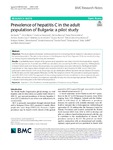Prevalence of hepatitis C in the adult population of Bulgaria: a pilot study
Sperle, Ida
Nielsen, Stine
Gassowski, Martyna
Naneva, Zlatina
Perchemlieva, Tanya
Amato‑Gauci, Andrew
an der Heiden, Matthias
Bremer, Viviane
Golkocheva‑Markova, Elitsa
Hristov, Kristiyan
Kaneva, Elena
Simeonova, Yanita
Tenev, Tencho
Varleva, Tonka
Duffell, Erika
Zimmermann, Ruth
Objective
This study piloted a European technical protocol for conducting chronic hepatitis C prevalence surveys in the general population. The pilot study took place in the Bulgarian city of Stara Zagora in 2018, and results of setting up, conducting and evaluating the survey are presented.
Results
A probability-based sample of the general adult population was drawn from the local population registry, stratified by age and sex. A sample size of 999 was calculated, and accounting for 50% non-response, 1998 registered invitation letters were sent. Venous blood samples and questionnaire data were collected by the Regional Health Inspectorate in Stara Zagora. Blood samples were tested for anti-HCV, and if reactive for RNA. 252 (21.6%) of the participants were included in the study. Mean age and sex distribution differed between the participants (55.9 years, 60.3% females) and the total sample (48.9 years, 53.4%). The weighted chronic HCV prevalence among participants was 0.9% [95% CI 0.2–4.2%]. The approach of only sending registered letters contributed to a low response rate, and more efforts are needed to reduce non-response, especially among men and younger age groups. Results of the evaluation were integrated in the final technical protocol.
Dateien zu dieser Publikation
Keine Lizenzangabe

